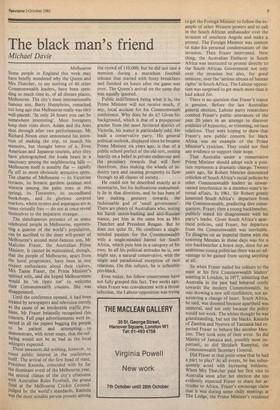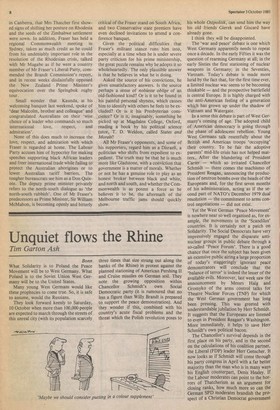The black man's friend
Michael Davie
Melbourne Some people in England this week may have briefly wondered why the Queen and Mrs Thatcher, to say nothing of 40 other Commonwealth leaders, have been spending so much time in, of all distant places, Melbourne. The city's most internationally famous son, Barry Humphries, remarked not long ago that Melbourne really was very well-placed: 'In only 24 hours you can be somewhere interesting'. Most foreigners keep their visits short. Adam and the Ants shot through after two performances. Mr Richard Nixon once announced his intention of making the trip, to launch his memoirs, but thought better of it. Even American and Japanese tourists, after they have photographed the koala bears in a sanctuary among the neighbouring hills — Melbourne itself is notably flat — rapidly fly off to more obviously attractive spots. The charms of Melbourne — its Victorian terraces, its botanic gardens (azaleas and wisteria among the palm trees at this Spring), its Tintoretto, its secondhand bookshops, and its glorious covered markets, where oysters and asparagus are at times virtually free — do not at once reveal themselves to the impatient stranger.
The simultaneous presence of so many celebrated people in Melbourne, representing a quarter of the world's population, can be ascribed to the sheer will-power of Melbourne's second most-famous son, Mr Malcolm Fraser, the Australian Prime Minister. It cannot be maintained, though, that the people of Melbourne, apart from the hotel proprietors, have been in any respect enthusiastic about their visitors. Mrs Tamie Fraser, the Prime Minister's Spirited wife, said she hoped Melbournians would be 'on tippy toe' to welcome their Commonwealth cousins. She was disappointed.
Until the conference opened, it had been treated by newspapers and television merely as the cause of an intolerable traffic problem. Mr Fraser belatedly recognised this Concern. Full page advertisements were inserted in all the papers begging the people to be patient and attempting to demonstrate, with street maps, that the suffering would not be as bad as the local whingers expected.
These measures did nothing, however, to rouse public interest in the conference itself. The arrival of the first head of state, President Kaunda, coincided with by far the dominant event of the Melbourne year, the annual climax of the city's obsession With Australian Rules Football, the grand final at the Melbourne Cricket Ground: Judged by the world's standards, Kaunda was the most notable person present among the crowd of 110,000, but he did not rate a mention during a marathon football telecast that started with footy breakfasts and finished six hours after the game was over. The Queen's arrival on the same day was equally ignored.
Public indifference being what it is, the Prime Minister will not receive much, if any, local acclaim for his Commonweath conference. Why does he do it? Given his background, which is that of a prosperous grazier from the most favoured district of Victoria, his stance is particularly odd. He leads a conservative party. His general political outlook, displayed since he became Prime Minister six years ago, is that of a public school prefect of the old sort, resting heavily on a belief in private endeavour and the pecuniary rewards that will flow therefrom, thus making the wheels of industry turn and causing prosperity to flow through to all classes of society.
He could not be described exactly as a monetarist, but his inclinations undoubtedly lie in that direction, and he has been of late making gestures towards the fashionable god of 'small government'. There are plenty of Australians who, noting his harsh union-bashing and anti-Russian stance, put him in the same box as Mrs Thatcher and President Reagan. But he does not quite fit. He combines a singleminded passion for the Commonwealth with a single-minded hatred for South Africa, which puts him in a category of his own. In all his political attitudes he is, one might say, a natural conservative, with the single and paradoxical exception of race relations. On this subject, he is inflexibly pro-black.
Even today, his fellow countrymen have not fully grasped this fact. Two weeks ago, when Fraser was convalescent with a throat infection, the Labour opposition was trying to get the Foreign Minister to follow the example of other Western powers and to call in the South African ambassador over the invasion of southern Angola and make a protest. The Foreign Minister was content to state his personal condemnation of the invasion. Then Fraser intervened. Next thing, the Australian Embassy in South Africa was instructed to protest directly to the South African Government not only over the invasion but also, for good measure, over the 'serious abuses of human rights' in South Africa. The Labour opposition was surprised to get much more than it had asked for.
There is no question that Fraser's stance is genuine. Before the last Australian general election, Labour party researchers combed Fraser's public utterances of the past 20 years in an attempt to discover evidence of hypocrisy, or trimming, on race relations. They were hoping to show that Fraser's new public concern for black Africa was an example of the Prime Minister's cynicism. They could not find any evidence to support their hope.
That Australia under a conservative Prime Minister should adopt such a position represents a dramatic change. Twenty years ago, Sir Robert Menzies denounced criticism of South Africa's racial policies by other Commonwealth leaders as unwarranted interference in a member-state's internal affairs. In 1961, Sir Robert grimly lamented South Africa's departure from the Commonwealth, predicting dire consequences. Fraser, then a young backbencher, publicly stated his disagreement with his party's leader. Given South Africa's apartheid policies, said Fraser, her departure from the Commonwealth was inevitable. To disagree on an imperial theme with the towering Menzies in those days was for a tiro backbencher a brave step, since for an ambitious young politician there was no advantage to be gained from saying anything at all.
So when Fraser nailed his colours to the mast at his first Commonwealth leaders' meeting in London, in 1977, admitting that Australia in the past had behaved coolly towards the modern Commonwealth, he was showing a new self-confidence, not announcing a change of heart. South Africa, he said, was doomed because apartheid was immoral, and not only because the policy would not work. The whites thought he was grandstanding, but not the blacks. Kaunda of Zambia and Nyerere of Tanzania had expected Fraser to behave like another Menzies. They took note of their error. So did Manley of Jamaica and, possibly most important, so did Shridath Ramphal, the Commonwealth Secretary General.
Did Fraser at that point sense that he had a part to play? At all events, he has subsequently acted with increasing boldness. When Mrs Thatcher paid her first visit to Australia soon after her election she too evidently expected Fraser to share her attitudes to Africa. Fraser's entourage claim that it was during some chilly meetings at The Lodge, the Prime Minister's residence in Canberra, that Mrs Thatcher first showed signs of shifting her posture on Rhodesia and the seeds of the Zimbabwe settlement were sown. In addition, Fraser has held a regional Commonwealth meeting in Sydney, taken as much credit as he could from his undeniably important role in the resolution of the Rhodesian crisis, talked with Mr Mugabe as if he were a country member of Mr Fraser's Liberal Party, commended the Brandt Commission's report, and in recent weeks disdainfully opposed the New Zealand Prime Minister's equivocation over the Springbok rugby tour.
Small wonder that Kaunda, at his welcoming banquet last weekend, spoke of 'dear Malcolm, brother and colleague' and congratulated Australians on their 'wise choice of a leader who commands so much international love, respect, and admiration'.
None of this does much to increase the love, respect, and admiration with which Fraser is regarded at home. The Labour Party accuses him of hypocrisy for making speeches supporting black African leaders and freer international trade while failing to protect the Australian aborigines or to lower Australian tariff barriers. The tougher bureaucrats see him as a Don Quixote. The deputy prime minister privately refers to the north-south dialogue as 'the north-south rubbish'. One of Mr Fraser's predecessors as Prime Minister, Sir William McMahon, is becoming openly and bitterly critical of the Fraser stand on South Africa, and two Conservative state premiers have even declined invitations to attend a conference banquet.
Given the political difficulties that Fraser's militant stance runs him into, especially at a time when he is under severe party criticism for his prime ministership, the great puzzle remains why he adopts it so wholeheartedly. The only plausible answer is that he believes in what he is doing.
Asked the source of his convictions, he gives unsatisfactory answers. Is the source perhaps a sense of noblesse oblige of an old-fashioned kind? Or is it to be found in his painful personal shyness, which causes him to identify with others he feels to be excluded? Or is it his Presbyterian conscience? Or is it, imaginably, something he picked up at Magdalen College, Oxford, reading a book by his political science tutor, T. D. Weldon, called States and Morals?
All Mr Fraser's opponents, and some of his supporters, regard him as a Disraeli, a politician who shifts from expedient to expedient. The truth may be that he is much more like Gladstone, with a conviction that government is a matter of morals. Whether or not he has a genuine role to play as an honest broker between black and white, and north and south, and whether the Commonwealth is as potent a force as he believes it to be, the aftermath of the Melbourne traffic jams should quickly show.







































 Previous page
Previous page